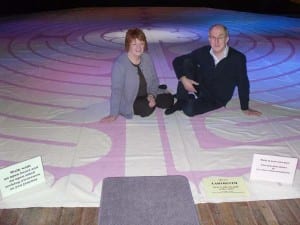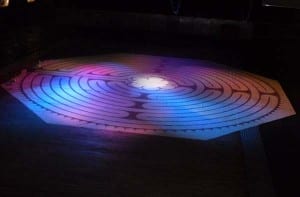A collection of Anglo-Saxon manuscripts from the Parker Library at Corpus Christi, Cambridge, has been digitised and is now available on the internet. Take a look. They are a fabulous glimpse into history. My first thought was how can digital data ever compare with these beautiful pages showing the lost art of illumination, from a time when few could read and even less had access to the expensive inks and vellum parchments. What will we leave behind other than mountains of obsolete system units and monitors and electronic content that’s inaccessible without the means to interpret and display it. But then you realise that without an internet collection we wouldn’t be seeing these manuscripts in the first place. The only ones I’ve seen have been in various museums around the country and the Henry VIII exhibition last year at the British Library (cost in the travel and entrance ticket). So maybe the virtual is better than not having the reality at all. If you need convincing then the British Library’s Turning the Pages should do it. This digitisation of priceless manuscripts has been online for several years. As well as Leonardo, Blake and Austen, it includes treasures like the changing seasons of the Luttrell Psalter and the stunning anglo saxon Lindsifarne Gospels. Virtual history doesn’t get much better than this!
Category: Uncategorized
Exams are unfair modes of assessment; discuss.
Exams should no longer been seen as effective methods of assessment; at least not unseen papers consisting of three essay type questions to be answered in three hours that cover a three month intense theoretical based course. I took one of these ‘bad experiences’ this week; at an exam centre I’d never been to before; it had with no car parking facilities, and was in the centre of York, over 50 miles from my home, all factors that added to the stress. The subject of the course was psychoanalytical and sociological theories of identity construction. It was helpful that this covered materials from the subject of my first MA in Gender Studies. I felt I had knowledge and understanding of the subject matter but knew from the start that when it came to an exam, then recall was going to be a problem. I’m taking an MA in Open and Distance Education with the OU and their study materials are excellent. I read the preparation for exams booklet from front to back, followed a revision plan and drew the mind maps that suited my visual learning style. But an hour into the exam and I knew that I couldn’t ‘remember’ any more than I’d already made notes on. It was like my memory was saying enough is enough and had shut down. I could see my diagrams in my head, the shapes and the colours, but not the text. I don’t know if this is a learning disorder, early Alzheimer’s or a symptom of a heavy work load that regularly extends into evenings and weekends. What I do know is that it felt like an unfair assessment of my ability, and I felt discriminated against by a mode of assessment that for me just doesn’t reflect my knowledge and understanding or allow me to do myself justice. I would be very interested in other people’s response to this.
Walking the Labyrinth
Wild and Willing
The third floor corridors of the MHT Building are looking better for a new coat of paint (although it seems slightly mad to do this while staff and students are trafficking by). The collection of framed film prints and posters in the stairwell also look good. I was intrigued by The Wild and The Willing, filmed in Lincoln in 1962. The plot outline on IMDB didn’t hugely appeal but out of interest I watched the first segment on YouTube (1/12). Like all vintage films it provides a snapshot of the social and cultural attitudes of the day; in particular, local reaction to having students in their midst. Prophetic or not? Watch and make up your own mind!
I also came across this 1997 THES article from Roger King, late of this parish, or VC of the University of Lincolnshire and Humberside as he and we were once known. Again, it’s interesting to look at then and now. Don’t you just love Google sometimes 🙂
What about Carl Jung?
TMA2 completed (and backed up twice, thrice and more). Continuing to look at the self, the course materials stepped back from Lacan’s ‘subject of language’ approach to the early psychoanalysis of Freud and Klein. TMA2 was about the effect of Kleinian thought on social relations compared with more recent developments in sociology. In psychoanalysis the root of identity is underpinned by primitive emotions and desires; a product of unconscious reactions to early experience. We learn to repress socially unacceptable behaviours and develop defences, which sometimes turn to neuroses, in later life. Sociologists such as Giddens, deny there is an unconscious layer and suggest that identity is a product of post-traditional culture. Freed up from pre-established restraints of family, subjectivity is about reflexivity; founded on future possibilities, based on individual choice. Psychoanalysis has largely been replaced by psychodynamic counselling and the origin of the authentic self transferred from the internal psyche to the external environment.
I wonder where Jung is in all of this. Subjectivity for Jung was inherent “. . . Man brings with him at birth the ground-plan of his nature. . . .” (Collected Works 4: 728) Neither a product of an unknown psyche nor a cultural response, identity was part of a shared spiritual experience. “In some way or other we are part of a single, all-embracing psyche, a single ‘greatest man. . . .'” (The Spiritual Problem of Modern Man [Collected Works 10: 175])
What’s been most interesting about this unit is the evidence of a changing knowledge base but Jung seems to have slipped out of the frame altogether. What’s missing often says more than what is present. As what we don’t say reveals more about us than what we do. One problem with Jung is that he was seen as discrediting Christianity and his reputation unfairly damaged. Unfairly because Freud was also anti-religion and far more vehemently so. But I wonder if there is another reason. In an era of individualism, and dominance of the narcissistic personality type, it’s maybe not surprising that the idea of a shared spirituality is downplayed. With sharing comes responsibility and in a postmodern, post-traditional society, that’s no longer a popular idea. However, to cover Freudian psychoanalysis without at least a mention of his one time partner or his work on myths, symbols, archetypes and the collective unconscious is a loss and discredits his contribution to the literature on the identity of the self.
Read this and be warned…
I hate the torch icon. Especially when it shines its light from side to side in what the designers must have imagined looked like hopeful anticipation. Windows is searching for a copy of this document. To locate the file yourself click Browse. Why bother; the Missing Shortcut menu is always bad news. I’ve been using computers for longer than I care to remember. Over the years I’ve made a few mistakes. But it’s been a long since I lost a document. Yes I did name and save it to a folder on my hard drive. Yes I did regularly press save throughout the seven hours I spent working on it. No I didn’t get any error messages. Yes it did close down nicely without any problems. And then promptly disappeared. Like being swallowed by a black hole inside my laptop. I suspect the chances of this happening increase in direct proportion to the importance of the file – in this case my OU assignment. So don’t just save, make a back up copy. On a cd. On a data stick. Your computer isn’t to be trusted. It’s not your friend. It doesn’t like you. It has a mind of its own and is not afraid to use it. Read this and be warned….
Reinterpreting Oedipus
My second assignment is fast approaching, gathering speed in the way that only deadlines do. Nombre deux goes back to the roots of psychoanalysis. Familiarity with Dr Freud’s concepts of tripartite personality and the oedipal process is a prerequisite. The starting point is Melanie Klein and Object Relations theory. The essay title is along the lines of ‘what has object relations ever done for us?’ The answer seems to be quite a lot – but only if you lived in the UK. The fall out between Anna Freud and Mrs Klein, resulting in Miss Freud moving to America to peddle her father’s psychoanalytic practice, led to an Atlantean split in ideas and approaches. Interestingly, both ladies seem to have issues which suggest all was not well in their own ‘psychic’ lives; particularly intriguing is the estrangement between Klein and her daughter. For someone who promoted expertise in the management of infant anxiety, she seems to have well messed up her own maternal practice.
Following on from recent posts on the potential resurgence in feminist politics, I’m finding it appropriate to be revisiting identity construction. Both Freud and Klien were products of their cultural time with an unchallenged acceptance of partiarchal systems and values. When Karen Horney postulated womb envy as an alternative to penis envy, and dared to suggest that rather than a portion of the male anatomy what women were really envious of was the male role in society, her work was not enthusiastically received. Most 20th century analytic thought still rests on Freud’s oedipal assumptions despite their emphasis on the category of male and invisibility of the female, perceived as lack rather than possession. The symbolism of Oedipus blinding himself is apt one, in more ways than Freud might have ever realised.
learning in a single dimension
Feedback on TMA1 is the first ‘real’ contact I’ve had with my OU tutor but I’ve no idea how others have done on this assignment. There is nothing with which to compare my own progress. I’m still experiencing the absence of a virtual dimension to my learning as a loss rather than a gain. I miss the sense of cohort with other students and without the motivation to log onto my learning area to see who has posted what on the discussion board, it’s much harder to coerce myself into picking up the book and engaging with the content. The paradox is online submission and electronic marking of assignments. I still need to word process my assessed work and log onto the OU site, where there is a module entitled D863 Identity in Question but with no content behind it. The value of this traditional distance unit is that it clearly demonstrates the benefits of a virtual learning environment. Isolated at home with my study materials is a single dimension experience. Previous units involving assessed online activities and contributions, not to mention the camaraderie and support of fellow students, added a multi dimensional aspect to learning which should never be underestimated.
analogue roots, digital futures
Check out the RewindVintageMuseum Those of us in the digital age, with analogue roots, are a unique generation. We remember a different time, when mobile technology meant a transistor radio. A time before the marriage of the words media and digital. As media technology developed so we possessed it greedily. Stored away in lofts and attics we probably still do, unable to let go because of the memories it contains. Our first LPs, compilation cassettes, family video tapes and boxes of photograph albums. As analogue evolved into digital, this memorabilia has become archaic. It represents a life that has moved on. We have the media but can no longer access the message.
Digital media is one dimensional. You can’t get attached to a mp3 track. It isn’t significant like an album cover. There’s no personal investment. A download won’t increase in value or become collectable. Those days are gone.
What will be the memorabilia of the future? An empty digital photo frame? We laugh at the Betamax VCR but it’s got no intrinsic value; like walkmans and ipods it was functional; with that function removed, it’s junk. Like old fridges and washing machines, it begs the question of what to do with redundant technology. Future focus may be on content rather than means of transmission. Single, not multiple, devices could answer problems with waste. Individuality would derive from the customisation of virtual portals, My Space style, meaning we wouldn’t just access digital data, we’d have to learn to work with it too.
A Digital Britain needs to recycle more efficiently. Especially electronics and their packaging. So much of what we throw away this Christmas will end up in landfill. That’s not sustainable practice. The invisibility of virtual delivery has to be something to celebrate; inevitably the next step will be to reduce the means by which we access it.
Challenging Google
A French court has fined Google for reproducing books without paying for the right to do so. The US Authors Guild have also sued Google for copyright infringement. The compensation settlement covers books published in the US, UK and Australia but is not yet in force. It’s taken three years for the case in France to be resolved. How many more are waiting? Google has taken the approach of do it first, worry later. The aim to scan every out of copyright/out of print book in existence is not going smoothly. Second hand, Independent and antiquarian book sellers, those of them that are still left in business, will be watching events with interest.


